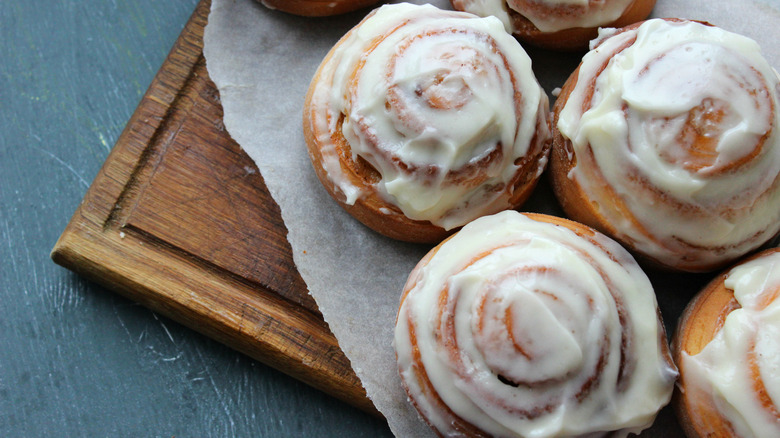The Cinnamon Roll Tip Great British Baking Show Champ Sophie Faldo Swears By
Few foods evoke the idea of a long, leisurely breakfast over a pot of coffee like a pan of freshly baked cinnamon rolls. Perhaps it is because making them is a leisurely process, too. The dough can often be made ahead to allow the rolls to rest and rise in the fridge overnight. That way, by the time you wake up in the morning, you have very little work to do besides baking the cinnamon buns and making the coffee.
Whatever recipe you use, chances are it calls for milk to enrich the dough. But newer recipes often don't require you to scald the milk, which is the process of cooking and cooling it before incorporating it into the dough. This used to be something that was a normal step in recipes from long ago due to the lack of pasteurization at the time (via Kitchn). Sophie Faldo, the Season 8 winner of "The Great British Baking Show," still swears by this step though (via Fab Flour).
Sophie Faldo's tip focuses on the dough
While there are a few reasons you can opt to scald milk in your baking today, according to Kitchn, there is one very good reason that Faldo recommends this for cinnamon rolls and other breads. Milk includes whey, which is a liquid protein that often turns clear and is shed during the cheese-making process. But in milk, both this liquid whey protein and the fat solids are still homogenous.
By scalding the milk before you use it in the dough, the whey is made inactive, according to Fab Flour. When milk is not boiled prior to adding it in, the whey can actually work against the gluten, weakening it. If this happens, then the dough may not rise like it should. So in scalding the milk, you should get a good rise from your dough every time. This extra step isn't hard or too time-consuming, but it could make all the difference in your big, fluffy cinnamon rolls. So give it a try to see if it helps your batch turn out exactly as you'd like.

